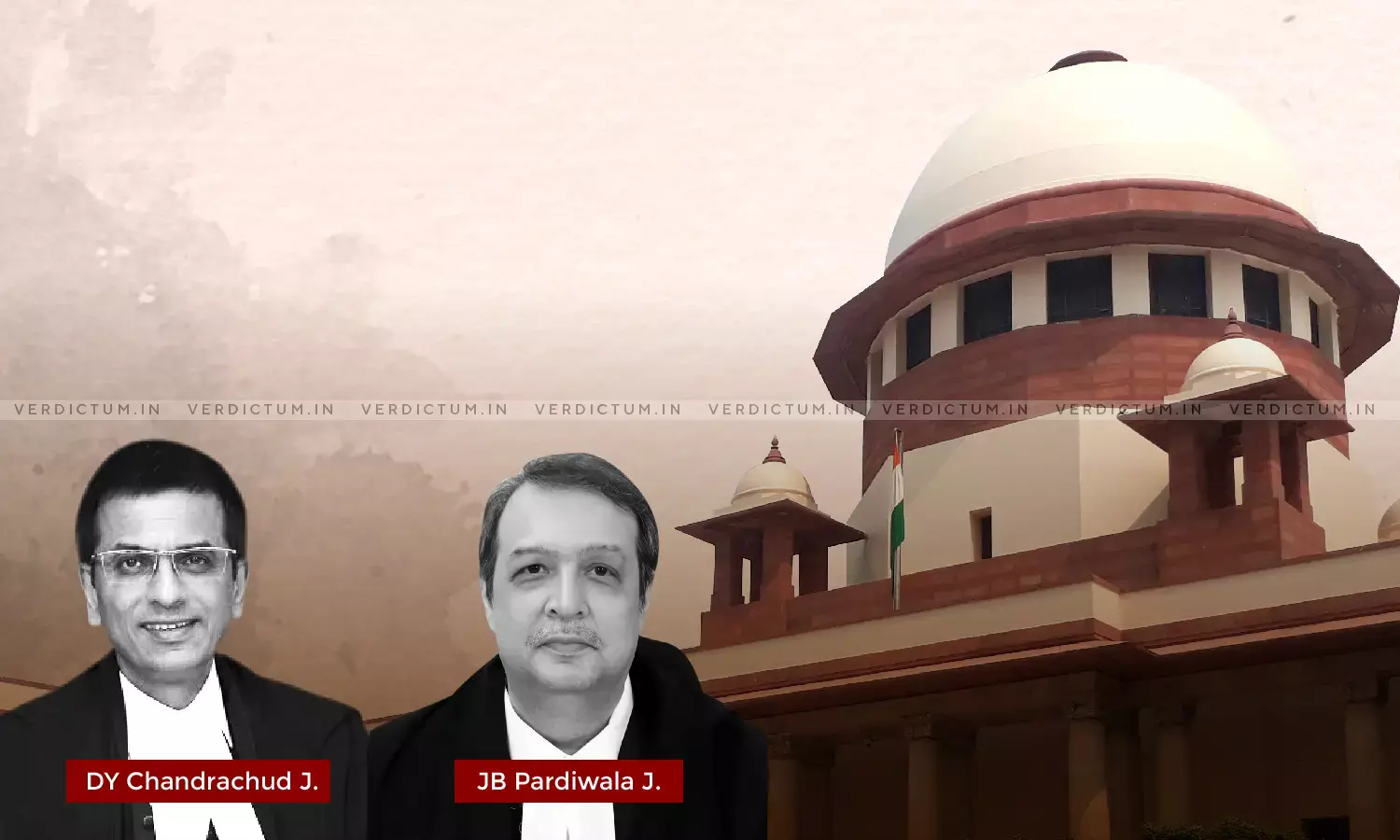Provisions Of Limitation Act Shall Not Apply To Claim Made By Notified Person Under Special Court Act 1992 – SC

The Supreme Court in a judgment dated August 4th adjudicated upon a case related to the Special Court (Trial of Offences Relating to Transactions in Securities) Act 1992 and the applicability of Limitation Act 1963 to such cases.
The Bench of Justice DY Chandrachud and Justice J.B. Pardiwala observed that the provisions of the Limitation Act shall not apply to the claims for the recovery of the loan amount under the Act of 1992.
The Court while holding so placed reliance on the judgment of the Apex Court in the case of L S Synthetics Ltd v. Fairgrowth Financial Services Ltd and Another and opined –
"In L S Synthetics Ltd (supra), the appellant had obtained short term loans from a notified party. The Custodian had called upon the appellant to furnish details of the loan. The notified party initiated proceedings before the Special Court seeking a direction to the appellant to pay the Custodian on his behalf. The contention of the appellant was that the claim was barred by limitation since he had furnished the full details of the amount in question to the Custodian in 1993. On the question of whether the claim of the notified party is barred by limitation, the three-Judge Bench of this Court held that provisions of the Limitation Act have no application, "in so far as directions required to be issued by the Special Court relating to the disposal of the attached property are concerned".
In this case, Fairgrowth Financial Services Ltd., the second respondent had advanced a short-term loan to Raviraj Housing Corporation, the third respondent for a sum of Rs. Twenty-Five Lakhs and agreed to repay it within 180 days with interest @20% p.a. The First Respondent was the Custodian appointed by the Central Government. The custodian notified the second Respondent as 'notified person' under Section 3(2) of the 1992 Act.
The case of FFSL was that the third respondent had executed a promissory note on 14 October 1991 for the repayment of the loan and a letter of undertaking-cum-indemnity reiterating its commitment to repay Rupees twenty five lakhs. FFSL instituted Miscellaneous Petition No 15 of 2000 against the third respondent for the recovery of an amount of Rupees twenty five lakhs, together with interest at the rate of twenty per cent. On 28 March 2003, the Special Court directed the third respondent to pay to FFSL a sum of Rs 63.86 lakhs, together with interest at twenty per cent on the principal sum of Rupees twenty five lakhs from the date of the institution of the petition till payment and/or realization.
Later, the Appellant offered to pay the principal amount and sought a waiver of the interest. The first respondent stated that the decision on waiver of interest on the decretal sum rests with the Special Court under the Act of 1992. The Custodian stated that pending the filing of an application before the Special Court seeking a waiver of interest, the principal amount be sent to FFSL expeditiously. The Appellant admittedly paid an amount of Rs. 1 lakh.
The First Respondent moved an execution petition before the Special Court. The Execution Application was contested by the appellant on the ground that it was barred by limitation. The appellant submitted that though the decree was made in 2003, the first demand by the custodian was made sixteen years later on December 16 2011 and the delay has not been explained.
The Special Court had held that the claim of the First Respondent was not barred by limitation as the Appellant had also acknowledged his liability to pay off the debt.
Senior Counsel Huzefa A Ahmadi appeared for the Appellant while Counsel Arvind Kumar Tewari appeared for the First Respondent before the Apex Court.
The Apex Court referred to L S Synthetics Ltd. (supra) where the Court had held that Section 29(2) of the Limitation Act is not applicable to the Act of 1992 since in terms of the provisions of the Act, no period of limitation is prescribed.
"Based on the decision of this Court in L S Synthetics Ltd (supra), the ultimate directions which have been issued by the Special Court cannot be interfered with. The observations contained in the impugned order were for the purpose of issuing the directions for a disclosure of assets and would not preclude the Custodian from urging that the Act of 1963 had no application to the Execution Application which was filed for enforcement of the decree dated 28 February 2003. The directions for the disclosure of assets and other consequential directions which have been issued are not interfered with in this appeal," the Bench opined.
The Court granted the Appellant four weeks' time to file his disclosure of assets subject to his right to urge his submissions in the execution application.
During the proceedings, the Court was apprised of the fact that an application has been filed for the arrest of the appellant, with regards to this, the Court held –
"Conditional on the appellant making the disclosure of assets within four weeks as directed above, the application for arrest shall not be pursued until the Execution Application is decided."
The Court directed the Special Judge to dispose of the Execution Application preferably within a period of two months of the date of receipt of a certified copy of this order and disposed of the appeal.
Cause Title – Manjit Singh Sodhi v. The Custodian & Ors
Click here to read/download the Judgment

